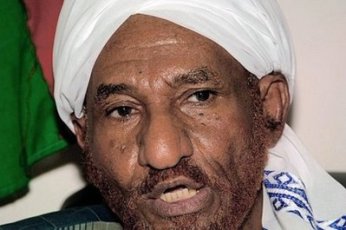Sudan’s ex-PM says country overtaken by a ‘minority party’
February 15, 2010 (KHARTOUM) –The former Sudanese Prime Minister Al-Sadiq Al-Mahdi launched his presidential elections campaign by directing fierce criticism against the ruling National Congress Party (NCP) describing it as a “minority party”.

“The plight of our country was escalated by a minority party seizing power and imposing a single identity, an Arab Muslim [one] on a country with multiple religions and cultures and considering [anyone] refusing to comply with this trend a rogue,” the Umma Party leader said in a press conference today.
“This approach is the one that turned a security war to a jihadist war, deepening the national rift and attracting to an internal conflict outside parties which used to intervene timidly but are now intervening aggressively,” he added.
Opposition parties often blame Bashir and his party for overthrowing the democratically elected government of Al-Mahdi in 1989 which was close to signing a peace agreement with Sudan People Liberation Movement (SPLM) led by its late leader John Garang.
They further claim that following the coup, the new Sudanese army intensified its campaign in the South seeking to impose a military solution and creating a secessionist mood that did not exist before.
Al-Mahdi said that the NCP sought to garner Darfuri support using policies that that destroyed the socio-political fabric in the region and crushing the armed rebellion using “ethnic weapon” which led to “politicized ethnicity” and a “humanitarian crisis due to crimes against humanity” which led to international intervention.
Darfur has historically been the stronghold of the Umma party but observers say that the support has weakened through the years and many Darfuris say that Al-Mahdi has abandoned their plight and sided with the NCP.
The Umma party chief mocked NCP claims that they have eliminated long lines of people seeking to obtain basic necessities such as bread or gasoline and outlined what he described as “new ranks” created.
– Ranks of people fleeing from the oppression of the regime and deteriorating livelihood to the four corners of the world: 6 million.
– Ranks of those whose villages were bombed and burned and fled displacement internally and externally: 3 million.
– Ranks of those removed from the civil service for no good cause: 300,000.
– Victims of torture in the “ghost houses”.
– 28 Ramadan military officers who were executed without fair trials.
– Victims of carrying hard currency including Magdi, Gerges and others whose blood are crying for justice before God and people.
– Ranks of beggars who have been forced by “industry of poverty” in the present regime to stand in the streets and mosques.
– Ranks of drug addicts, a phenomenon associated with the frustration that filled the villages and urban areas.
– Ranks of unidentified newborns as a new phenomenon with this magnitude in the country. 1,001 per year.
– Ranks of AIDS patients, which has become an epidemic in the country for the first time in its history.
The ex-PM slammed the ruling party for using “national” soccer teams to for its elections campaign namely Al-Hilal and Al-Merreikh. Bashir inaugurated his campaign in Al-Hilal stadium on Saturday with the presence of 40,000 supporters. He also donated 1 billion Sudanese pounds to Al-Merreikh which in return handed him a pledge of support.
Among the accusations leveled by Al-Mahdi against the NCP is blemishing the image of Islam throughout its two decades rule.
“They have spoiled the good name of Islam because they associated Islam with dictatorship, they associated Islam with violence,” Mahdi, who leads the opposition Umma party, told Reuters.
“We believe that this is most unacceptable. Islam welcomes freedom, justice, tolerance and we think that they have blemished the good name of Islam in linking it with their restrictive, oppressive policies,” he said, speaking in English.
Mahdi told Reuters he would not take revenge against Bashir’s party if Umma won the presidential and legislative elections, drawing parallels with a purge in Iraq of officials who were members of Saddam Hussein’s party.
“We are not vindictive … We think it was a mistake, for instance, in Iraq, when there was a change, that you simply disband the army, disband the Baath party,” he said.
“The result is that the social forces will simply immediately turn overnight into destructive elements … We say we would like the [National Congress Party] to be involved in the construction and peace and democracy in Sudan.”
Al-Mahdi repeated his party’s position that people accused of war crimes in Darfur should be tried by “hybrid” courts including foreign judges, without naming Bashir.
The Umma party says the start of an active legal case would allow the U.N. Security Council to use its powers to suspend the International Criminal Court (ICC) case. Al-Mahdi has recently said he will not hand Bashir to ICC.
Al-Mahdi promised to resolve the festering Darfur crisis and repair relations with neighboring countries and other world powers if he won the presidency.
He accused Bashir’s NCP of squandering Sudan’s oil revenues on security and “ostentatious expenditure”, and promised to redirect the cash to development.
(ST)
